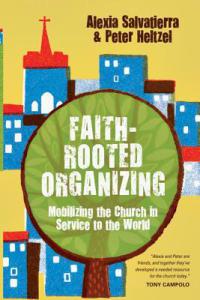
Faith-Rooted Organizing: Mobilizing the Church in Service to the World, Rev. Alexia Salvatierra and Peter Heltzel. Downers Grove, IL: InterVarsity Press, 2014.
Summary: Most advocacy and activism efforts have been organized around secular principles. The authors explore what organizing and advocacy work that is deeply and thoroughly rooted in Christian principles would look like and illustrate this from their years of experience.
Many community advocacy efforts have been organized around principles first developed by Saul Alinsky in the 1930’s. They hinge on an oppositional model that sees the other as “enemy” who needs to be forced or compelled to act justly by law or the pressure of a people movement.
Salvatierra and Heltzel do not deny the place of these efforts and in fact talk about both “serpent” and “dove” power as Christians make common cause with other activists. But they also contend that Christians have deep resources in their faith in which their organizing activities ought and may be rooted.
They begin with a historical survey of three justice movements: the civil rights movement, justice movements in Latin America and Cesar Chavez work in advocating for migrant crop workers. And one of the revelations of this book to me was to learn what a deeply spiritual man Chavez was, regularly fasting, and living at the level of those for whom he advocated.
The book then takes each step in the organizing process and re-roots it in faith-based practices:
- Goal setting as dreaming God’s dreams.
- Starting place: hearing the call of the poor, which if done well results in a dance of solidarity between poor and privileged.
- Strategy: discerning the kairos issue at the root of the deep lies that perpetuate injustice and combating these with the truth. This also means addressing issues of power and hope and speaking prophetically.
- Recruitment: what does it mean to both practice and mobilize Christ-centered community, mobilizing all the gifts of that community.
- Leadership development: this not only involves discerning the gifts and calling of others but modeling the servant leadership crucial to organizing.
- Sustainability: the importance of cultivating the deep spiritual practices and rhythms that sustain hope and energy.
As mentioned in the summary the authors illustrate their principles with stories from their years of organizing. At the end of each chapter, Alexia addresses a “letter” to her daughter and another young woman that sums up the chapter in her hopes for their organizing work.
It has struck me increasingly that a significant form of gospel witness is when Christians come alongside others making common cause around matters of justice and human flourishing and thoughtfully and graciously contribute the distinctive perspective that is shaped by their faith. Salvatierra and Hetzel give us a marvelous example of what this looks like in the nitty-gritty of organizing.
Editor’s Note: Thank-you to Bob Trube for sharing his reviews with Emerging Scholars! Bob first posted the above review on Bob on Books. As you may remember, Faith-Rooted Organizing is part of Campus Resources from InterVarsity Press: 2015-2016 Academic Year Edition. If you’re still searching for books to read this summer and/or prepare a reading group for the fall, be sure to check out this list with attention to the Four Commitments and the Focused Ministries of InterVarsity Graduate & Faculty Ministries. Enjoy. To God be the glory! ~ Thomas B. Grosh IV, Associate Director, Emerging Scholars Network
Bonus: InterVarsity Press interview of Rev. Alexia Salvatierra (3 minute, 14 seconds).
Bob Trube is a former Associate Director of Faculty Ministry and Director of the Emerging Scholars Network. He blogs on books regularly at bobonbooks.com. He resides in Columbus, Ohio, with Marilyn and enjoys reading, gardening, choral singing, and plein air painting.

Leave a Reply